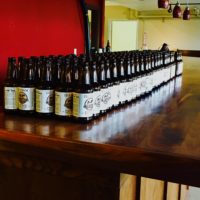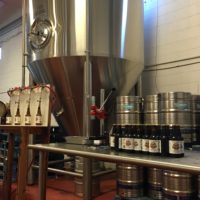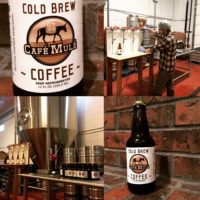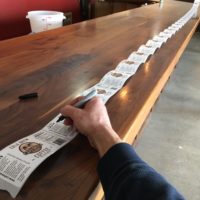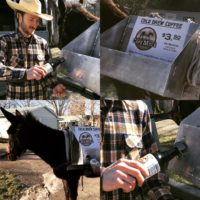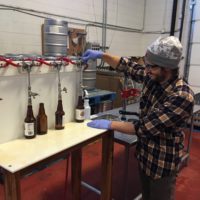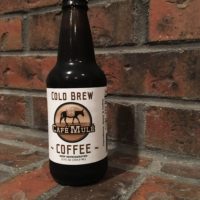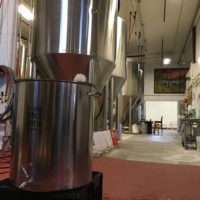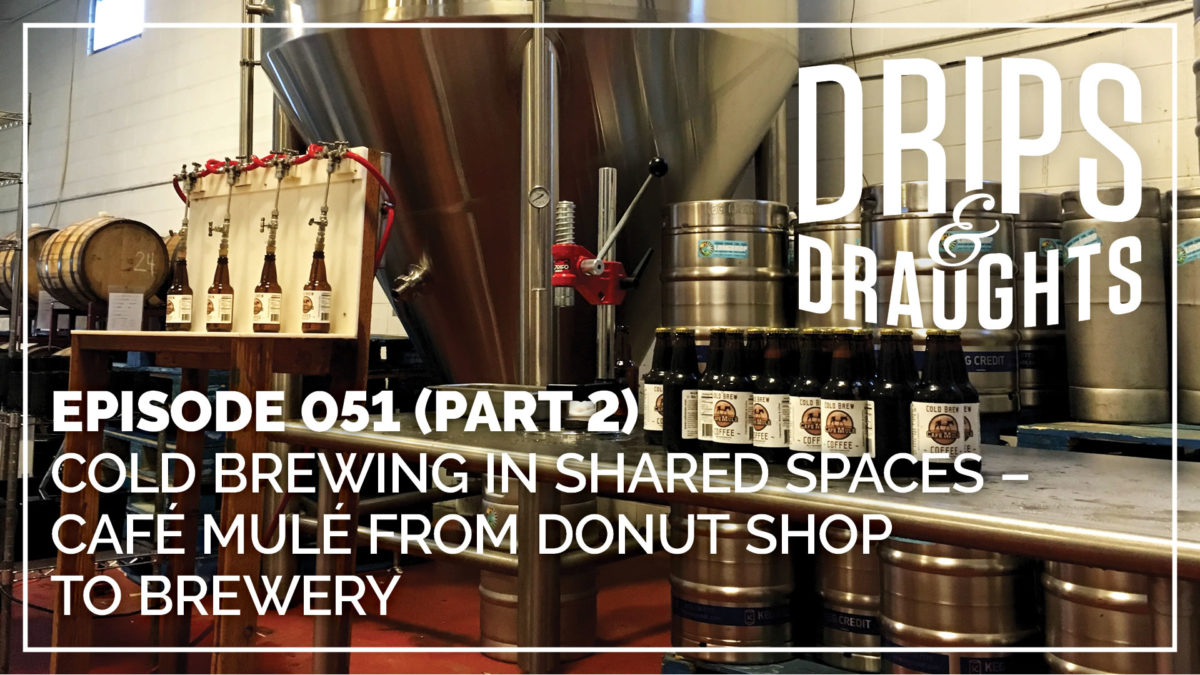
In this episode, we’re joined by Matt Bishop from Café Mulé out of Boise, Idaho to discuss cold brewing in shared spaces. Many bakers, caterers and others in the food prep industry use shared kitchen spaces for making their products, and with the increased popularity of cold brew coffee, shared kitchen spaces have become a source for cold brew coffee companies to produce their coffee in. Matt’s approach with Café Mulé was a little bit different – they initially used space inside the kitchen of a local donut shop, and now, they are sharing space inside their local brewery.
Highlights & Takeaways
Sharing space doesn’t necessarily require financial transaction, could optionally trade product for use of space
Sharing space gives many extra opportunities for collaboration
Sharing space allows unused space and resources to be further utilized
Cold brewing at refrigerated temperatures required addition of more time and more coffee vs brewing at ambient temperatures
Episode Gallery | What we mentioned on during this show
Episode 51 Transcript
Brendan Hanson: Hey there, you’re listening to the Drips and Draughts Podcast. As always I’m Brendan Hanson and I’ll be your host today. Today’s episode is part two of our series about cold brewing and shared spaces. If you missed part one of this series you can find that by going to dripsanddraughts.com/49. In episode 49, we were joined by Katy Stevens from N7 Cafe and Trish Cummins from Forage a shared kitchen space based out of Eau Claire, Wisconsin.
Today we’re joined by Matt Bishop from Cafe Mule in Boise, Idaho. Matt and his company Cafe Mule have an awesome storie so we love getting them on the show. They’re originally on back on September 30th of 2016, it was episode 26. If you have any interest in going back and listening to that episode you can find that by going to dripsanddraughts.com/26 or you can of course find it in Google Play or the iTunes Store.
Today we talk with Matt about the pros and cons of shared kitchen spaces and how they’ve helped him grow his company. A couple cool things that Matt brought up during our discussion, one was that in a shared space environment you don’t necessarily have to rent space out. You could barter, you could trade product. There’s a lot of different options when you’re sharing space especially if it’s unused space and two he brought up the fact that sharing space gives you the opportunity to collaborate with the other business owner that you’re renting space from or collaborate with other people who might be sharing that same space as well.
We’ve definitely got a good discussion coming up today with Matt from Cafe Mule and what I really like is he moved from sharing space in a doughnut shop to now he’s currently sharing space in a large brewery. He’s seen it all and he’s got a lot of good perspectives on that and last but not least to round out our cold brewing and shared spaces series we’ll be joined by Jason Gershowitz from the Coffee Counselor in episode 53 so that will be in a couple of weeks. Prior to that episode will be episode 52, that’s going to be our one year anniversary episode. We’re still looking for topics for that show.
If there’s anything you want us to discuss shoot us an email podcast@dripsanddraughts.com or reach out to us on social media. You can find us under the handle dripsdraughts that’s D-R-I-P-S-D-R-A-U-G-H-T-S and if any of you want to hear your voice on this podcast call our 888 number and leave us a message. You can leave a question, a comment and we’ll play it on the air. That number is 888-620-2739 extension 6. One more time that’s 888-620-2739 extension 6.
If you’re interested you’ve got a couple days left to enter our giveaway for the all-in-one countertop nitro coffee fridge. It’s a self-contained kegerator comes with a nitrogen tank. A keg, the regulator it’s ready to go. It’s basically valued at $1,500 we’re going to be giving one of these away. We’ll pick the winner live on our one-year anniversary episode which is next week.
If you’d like to enter to win that go to dripsanddraughts.com/giveaway. That’ll redirect you to the product page at the bottom of that page is there’s going to be a form. Just enter your name and email address and you’ll be entered for a chance to win. All right, that rounds out this intro. If you’re looking for links or show notes from this episode you can find those by going to dripsanddraughts.com/51. Let’s get into today’s episode with Matt Bishop from Cafe Mule where we discuss moving cold brew operations from a doughnut shop to a brewery.
[music]
[Advertisement]
Are you looking to get started with serving your favorite craft beverage on draft? Kegoutlet.com has you covered for all of your draft beverage needs. From complete kegerators to individual parts for upgrades and replacements. Keg Outlet will help get you pouring your craft beverage on draft. To learn more visit kegoutlet.com.
[End Advertisement]
Brendan: All right, now we’re joined by Matt Bishop from Cafe Mule in Boise, Idaho. How you doing Matt?
Matt Bishop: I’m doing great. Thanks for having me again Brendan and Cary.
Cary: Yes, welcome back.
Brendan: Absolutely. Last time you were on was episode 26, September 30th of last year and we introduced your business but, and I know you caught up with us in our year-end episode but if you wouldn’t mind for people who haven’t necessarily listened to that episode mind telling a little bit about your business?
Matt: Sure. We have a packed meal and we– this summer 17 times took off the up into the Boise foothills which is our surrounding trail network around the city here and we served either pour over coffee or cold brew on nitro off of our packed meal beside the trail. We go up there, we serve for free just for tips and donations. We do that once a week and we have a great time with it. We recently moved into bottling our own cold brew.
Brendan: Nice. That’s awesome, man. Yes, before we get too far into this I just got to check and make sure you’ve got enough free space on your hard drive so we don’t have any mishaps.
Matt: You have about four gigs and I know that because at– it’s a little after four right now and about 3:45 I was deleting files. [laughter] I was going through my downloads and I was just deleting anything I possibly could.
Brendan: Nice.
Matt: I figured some motivator for me to try to stay a little concise.
Brendan: Cool.
Cary: That’s right. I forgot about that last time.
Matt: You took a risk in sending me an outline and that outline might push me over on my capacity on the hard drive.
Brendan: Well, cool. Hey, for this episode you mentioned prior to the show you said, “Well, let’s share a beer again.” Last time we shared a beer from one of your local breweries so this time you made a couple suggestions on styles and I believe you’ve got a beer there.
Matt: Yes, absolutely. Do I still have you there?
Brendan: Yes, go ahead.
Matt: Yes, I’m sorry. Audio cut out for a sec. No, I’d love to share a beer and I have a Payette slaughter house India style red ale and I chose this because Payette is my commercial kitchen partner right now. They run a pretty big brewery operation here and I’m renting space from them. I thought it was only appropriate that I drink one of their beers on the show.
Brendan: Nice.
Cary: It’s perfect.
Brendan: We couldn’t find their beers out here so Cary picked up an Ale Smith for us.
Cary: Yes, the double red India pale ale and thought this was something going to be similar to what you’re drinking but I started reading the back of it and they just renamed it Bren, this is the old winter Ale Smith ale.
Brendan: Interesting.
Cary: I didn’t even know. I guess they just renamed it but it’s good beer.
Brendan: Sell it year round.
Cary: Really malty. They call it winter season though but, yes.
Matt: Good marketing on their part.
Cary: That’s right.
Matt: Well, cheers.
Brendan: And also, Matt, you suggested we– yes, cheers. You suggested we had some beers and Cary was like, “Oh, I’m going to be a part of this podcast for sure.”
Matt: I’m glad I could be of assistance.
Brendan: We’ve had a lot of requests. People wanting to learn about shared kitchens and we had another guest on who shared their experience. They work out of a facility that is basically a shared kitchen it’s– that’s what it is. It’s for people to go in, cook that might not necessarily be able to afford their own commercial space. I know you had worked out of a doughnut shop now as you mentioned you’re working out of a brewery. What are your thoughts on shared kitchens?
Matt: For us shared kitchens have been amazing and we really have gone through a couple different situations now and even before the doughnut shop we were willing to make or we were able to make a relationship with our local whole foods and they produced two batches of cold brew for us and work with us to keg those. Then we found a really awesome partner locally in Guru Doughnuts and we worked on a table in the back of their commercial kitchen and then when we got to the point where our operations and where we wanted to go outgrew that we found a local brewery Payette that was willing to basically lease us some space.
For us it’s been great because we couldn’t afford our own space, we certainly couldn’t afford the equipment that we have access too there and it was just a non-starter to try to find a space and that certainly pay some of the hook-up fees that the city requires and then equip it. It’s been a great deal for us in that manner.
Cary: Are you guys like the last guest we had on they were basically renting I guess by the hour. They’d go in and use it as they need it because they had a lot more people going through but I assume you’re more on like a weekly or monthly type lease space?
Matt: Yes, we are and we’ve had starting out with whole foods that was really a trade. It was a short deal, we needed a couple batches and we had an arrangement where they helped us out and we promoted one another on social media and we did a tasting for their staff and that was it. With the donut shop we were able to basically pay them as well on a trade type scenario. For use of their space, we would produce nitroed cold brew and give it to them at cost. We would essentially just charge them what it costs for the beans and the nitrogen and the sanitizer and stuff to refit our gear.
It wasn’t even a cash deal there and it was mostly on a month-to-month basis. There is no formal documents signed.
Brendan: Sure. [laughter]
Matt: Breweries are a little different. At the brewery we have a year long lease and there’s a payment schedule and we’re a little bit more formalized there but yes we’ve gone through the full spectrum. I’d say, even still though at the brewery things are very much have boiled down to personal relationships and us just finding the right partner who has been through some that maybe some growing pains themselves and you don’t want to pay it back or pay it forward and see where we’re trying to go. Even though there’s financial calculations and there’s trades I think there’s a big element of it that is just wanting to be working with people that you like and resonate with.
Cary: Yes, for sure that’s great.
Brendan: Yes, no kidding. Let’s talk about the pros and cons of a shared space. Real quick I mean just from the outside looking in. I’ve never produced commercially but obviously, I’m thinking business wise pros for you, the renter is you’re not having to take on the whole overhead of a space and then pros for the brewery or the doughnut shop is they’re getting something covered whether it’s by trade for product or a little extra cash in their pocket. What beyond now what would you say, are there any other pros?
Matt: Absolutely. I think touching back on we’ve always found the people that we resonate with and they want to see our success play out. They’ve introduced us to a lot of additional people. We’ve collaborated with each of the people that we’ve shared space with. With the doughnut shop, they did a month long donut that featured our cold brew in the filling and they promoted that very heavily on social media.
Brendan: Nice.
Matt: They also purchased our cold brew and then donated it to a charity event that they were partaking in, same thing on the brewery side. We had just taken over our lease with our brewery partner we hadn’t even really moved in yet. They approached us and asked if we would be willing to do a beer collaboration with them for an event that they were doing.
A Black Friday event, they do a celebration of all dark beers and they bring in breweries from all around the area to feature their dark beers. It was awesome to get to be a part of that and be showcased on a fairly large event.
That’s definitely a big pro that we’ve seen is just increasing your network and network doesn’t even seem personable enough of a term just increasing the relationships that you have and the goodwill that get spread around. The cons, I think we outgrew the arrangement we had with the doughnut shop because we wanted to bottle. One of the big cons of being in someone else’s space is that if you’re really committed to that relationship working you have to be incredibly tidy all the time. You have to know exactly where your boundaries are and not encroach outside of those.
Working on a table in the back of a doughnut shop was really doable when we were producing a couple of five-gallon kegs a week and putting those on nitrogen but it was not doable when we wanted to set up a bottling line and be able to spill product all over and be able to hose it down at the end of the day. In fact, I had somebody from the beverage industry right when we were counting that transition period between doughnut shop and brewery.
I needed to produce a batch in the doughnut shop and it was all getting keg to go to another brewery for this beer collaboration. I was pouring off 12 gallons of product and then I had to get it transferred into a sanke keg and I was having some issue with the whole transfer. I called a guy I know in the beverage industry and I say, “Hey, can you come over here and help me out just get through this problem and he did.”
Of course, things are spilling all over and he grabs the hose that’s for rinsing dishes out over the three compartments sink and he starts hosing down the floor and making this huge like wave across the floor. The owner of the doughnut shop happened to walk to the kitchen. I think I had this readable sheepish look on my face [laughter] because it’s just totally different standards between the–
Cary: Standard pat practice at a brewery–
Matt: Exactly.
Cary: –not on a doughnut shop.
Matt: The brewery it’s like, “Hey, let’s just throw stuff everywhere and then we’ll all rinse it down and sanitize the end and that’s great.” The retail doughnut shop is a little less geared towards just hosing things down. [laughs]
Brendan: Nice, yes. I think you’d mentioned in your email back to me that you got– you said and I quote, “We try extremely hard not to get in the way of the landlord’s operation.” I’ve got to imagine in like the doughnut shop atmosphere. Did you guys operate on the same schedule a lot of times or was there off hours for them where you took over the kitchen space.
Matt: Yes, that was actually a really great thing about collaborating with the doughnut shop is they do most of their baking at night. They’re dairy like craft donut scratch donut kind of place. They don’t bake anything and keep it. They bake enough for the day and when they sell out they sell out. It was really nice that we could operate in normal daylight hours and not be vampires and have the kitchen mostly to ourselves.
Most of the activities going on the day that maybe be washing dishes or something like that but they weren’t doing their intense business operations for getting their doughnuts produced when we wanted to be working. The downside to that though when working around somebody is something that we didn’t realize when we first started at the doughnut shop is that when you’re making doughnuts flour goes everywhere.
Part of us being in a concise space that we had negotiated out with them and being tidy was that, not only would we be in that space but we would cover everything we owned with plastic at the end of the day so that it could just get trash with flour and then we’d still have clean stuff. That’s one of those cons is their operations may impact your operations in some way and really their operations take precedence or at least that’s the way we’ve always seen it.
Brendan: Sure.
Cary: How many donuts would you say you ate while you worked there?
Matt: A lot, it was so the dangerous. [laughter] The dangerous thing is you would be there all day and invariably work through lunch and then what is there available. Well, there’s a ton of doughnuts and the minute we started working there was like, “Oh, you guys get the employee discount,” Oh that’s great, so now, I can buy more doughnuts. And then they have to get rid of their doughnuts at the end of the day so four o’clock comes around and if they have doughnuts left over you’re going home with a box. Yes, we ate a lot.
Brendan: You packed on some LBs there huh?
Matt: Well, that’s where I hiking with Richard. That’s- we try to–
Cary: Offset.
Brendan: Balance.
Matt: That’s right. And I should mention another part of the collaboration is working in somebody else’s space. If it’s a fit doughnuts and coffee go together. That doughnut shop gave us doughnuts every Saturday to take up and hike up on our pack meal. That was a whole other offering that we were able to have as doughnuts and coffee off of a trail in the middle of nowhere versus just coffee. We didn’t have to pay anything but we just needed it– we’re supporting one another.
Brendan: I’m sure you’re promoting the doughnuts shop when you’re giving those doughnuts out up and up in the trails.
Matt: Yes, absolutely not and doing it in a way that was just incredibly natural for what our relationship was.
Brendan: Yes, well, cool, let’s bounce over to talking about the shared kitchen space or now your shared brewery space went just specifically as it pertains to coffee because when you’re cold brewing coffee you’re typically steeping it for 12 to 24 hours so you’ve got a dedicated space now at the brewery?
Matt: We do I think Payette brewing has done really well for itself locally. They recently moved into a much bigger facility because they’re running a big canning line and they needed extra space for that. That left them with a building that they don’t use and as high volume anymore and they use it for more of their experimental brews. That’s the building that I actually have space in and one of the things that worked out really well is that they have a locked in refrigerator that they keep hops in that they don’t really need in full capacity.
That was a big win for us to find that and we were able to carve out a portion of that hops fridge and steep for 24 hours at a time. We got it incredibly fortunate in finding that situation.
Brendan: Yes. That’s very nice.
Cary: You guys are cold brewing. You are brewing at refrigerated temperatures?
Matt: We are. Back to the relationship thing, when we first signed our lease with Payette Brewing we did not know that we were going to be cold brewing. We had traditionally brewed at room temperature, steeping room temperature and at the same time we’re signing the lease, we’re working through all of the local Health Department requirements to get licensed as a food processor and we were the first people to request to do so in Idaho. There was a lot of back and forth and education and at the end of the day, a local health department wanted us to be as conservative as possible on many aspects of how we produced.
One of those things was we’re outputting a low acid product and so they wanted to see it refrigerated all the way through the process and maintain refrigeration afterwards. Because we were against putting additives into it as well. Getting back to the shared space we had initially said, “Hey, we want to lease X square feet of the brewery floor and we figured we were just going to set up metal racks and tables and do our operations there and then we had to go back to the owner of the brewery and say, “Hey, health department is requiring this. Is there anything else we can work out.”
I think because again we were looking for somebody we could have a really good relationship with. They were fortunately flexible to that and said, “Oh, yes. We have this hops refrigerator.”
Cary: That’s awesome.
Matt: Yes. It was awesome. The stars aligned we couldn’t be happier.
Brendan: No kidding. Not to get too off topic but in going from traditionally brewing at room temperature to now brewing at a refrigerated temperature, did you guys change your recipe or your steeping time at all or did you just stick with what you’re doing?
Matt: No. We definitely– we added about eight hours to our steeping time and we increased the quantity of coffee that we’re using to water, to increase the ratio.
Brendan: Wow.
Matt: Yes. We found that we got a lot more translucent product every refrigeration for comparative times and I just took those adjustments to our recipe to get it back to the strength we wanted.
Brendan: Wow interesting. We’ll have to maybe explore that with you further in a different episode. Now brewing at refrigerated temperatures I’m assuming your keg and bottle it’s obviously staying cold through that process I guess?
Matt: It is. Yes. We’re using really yeast brink. They were filling with water, we chill down all of our water ahead of time, there’s still quite a bit of manual labor going into our brewing process but we’ll chill our water in the walk-in then we’ll conduct our brew once it’s down to temperature and keep it completely chilled. We even keep our brink inside the refrigerator and run our lines out when we’re doing our bottling line.
Brendan: Wow, nice. Breweries typically have some pretty good water filtration in place so are you getting your water from them or are you bringing in water from outside? How’s that working?
Matt: No. That was another great thing about that space which would be a huge con. They– I’m sorry, huge pro.
[laughter]
Cary: Too many beers.
Matt: Yes. It’s the [unintelligible 00:25:20] already.
[laughter]
Matt: No. An amazing pro to being in the brewing spaces is that they have an onboard filtration system and we’re benefactor of that.
Brendan: That’s awesome.
Cary: Yes.
Brendan: Man, that sounds like the ideal place if somebody wants to start cold brewing because you’re working in a place that creates beverages, right?
Cary: Right. They’re set up to create that’s almost the same thing in a sense.
Matt: Yes. Absolutely. We are looking at it and have talked with the owners about it being a platform for our growth in the sense that at some point it just has the space that we can move out and be flexible and as long as they’re able to flex to that same thing in the facility it will be really good. Relationship wise again we’re not the only tenants there, there’s a hard cider company that’s operating there and we’ve been able to have a really good relationship with them.
We actually learned a lot from them because as we came into the space they were already operating there and they were bringing in a mobile canning unit, they were pasteurizing using the brewery’s brewhouse they were basically doing in-can pasteurization. We were able to go down there and watch them do all that stuff and just learn a lot. Huge win and that cider company they run their own tasting room and they bought our very first case of bottled product when it came off the bottling line. Just wins all the way around.
Cary: This is a little off topic again. I know we’re talking about shared kitchens but since you’re canning and bottling now, are you guys doing any pasteurization or how long is your product shelf stable for?
Matt: Yes. We are pasteurizing, we’re doing a post bottling pasteurization and our shelf life is incredibly conservative right now. It’s a 30 days. We’re really focused on maintaining the proper batch size for what we can distribute and we’re producing pretty labor-intensively and then we’re doing small batches and then distributing right away to give our retail partners the best benefit of that 30 days. We did a considerable amount of lab testing before we went into this production.
We’ve lab tested and pasteurized out to eight weeks and tasted out that far as well with great results all the way around. But it was just one of those things being the first to request to be a cold brew processor in the state. We had to make some concessions and we’re holding back samples now and hoping to continue further testing and get that shelf life pushed out further.
Brendan: Nice. We’re doing a little lab testing here. We’ve got a bottle behind me that’s–
[laughter]
Cary: Update?
Brendan: Yes. Bottled and it’s been sitting back there since May 21st of 2016. Still looking beautiful.
Cary: Doomsday for Brendan is coming up a couple of months. He has to try that.
Brendan: Yes. We’ll send you an invite if you want to come out and watch my face as I drink that.
Matt: Refrigerated or unrefrigerated?
Brendan: No. Just sitting in the office. It gets up to–
Cary: About 90 some days if we’re not here.
[laughter]
Brendan: Yes. During the winter it’s been 60s when we come in here so–
Matt: That’s awesome.
Brendan: Yes. It fluctuates a lot but yes, it still looks good.
Cary: It will be character.
Brendan: Yes. Four months is D-day for me. I’ll be trying that.
[laughter]
Matt: That has to be a live video. It has to be– yes. [crosstalk]
[laughter]
Brendan: Yes. We’ll promote that on Facebook live, maybe snapchat or Instagram live and see how that goes. I think one of the last things to talk about here with the shared kitchen space or you’re at a brewery so they’ve got a lot of waste in terms of spent grains you got spent grounds, do you guys use the same disposal process or do you have something that you’re doing with your grounds versus what the brewery is doing with their spent grains and hops?
Matt: Right now most of the time we’re just using what the brewery has in place already. We did– the last run that I did I happen to have a friend help me out. He’s a huge gardener so he took all my grounds off my hands. We would love long-term to find a community garden or somebody who can actually take all of those grounds but I think there’s only so acidic that the people want their soil. Right now if we can find people to take them we’re more than willing but if not we’re just using the same mechanisms that the brewery is.
Brendan: Cool. All right man. Well, gosh anything else? Did I miss anything on here, anything else you want to mention?
Matt: No. I think–
Brendan: We’re good?
Cary: Yes, I’m looking to the outlining. That’s great.
[laughter]
Brendan: We’re good man. It’s been great catching up with you again as always–
Cary: Thanks for coming on.
Brendan: And I appreciate you suggesting we have a beer on this lovely Friday afternoon.
Matt: Yes. I think you possibly found that I’m– [crosstalk]
Cary: We need more guest that suggest that–
Matt: Go ahead.
Cary: I said we need more guests that suggest we have beers on our podcast. [crosstalk] [laughter]
Matt: I thought that was a thing. I almost considered it like a given. We were on a podcast we’re going to share a beer.
Cary: Pretty much is.
Brendan: It is yes. [laughter] Outspoken.
[crosstalk]
Matt: Thanks for Brendan, Cary. This was awesome. I love being on here, and thank you for the sport that you guys have given me. Thanks for cross-pollinating with a lot of knowledge. It’s all good.
Brendan: Absolutely. Where can people go to find you if they want to learn more about you or Cafe Mule?
Matt: Sure. Right now, we have our website cafemule.com. C-A-F-E-M-U-L-E.com. We’re on Facebook and Instagram. Our Instagram handles is @richardthemule, that’s the name of our mule, but if you happen to find yourself in the Boise area. We’re at the Boise Co-op and one of the M&W Markets, Guru Doughnuts, Long Drop Cider, and Payette brewing with our bottled product and hopefully growing.
Brendan: Awesome, man. Hey, one last question. I know you guys have a store on your website, are you going to be selling, shipping bottles of cold brew?
Matt: No, in the short term. We’re mostly focused on retail distribution, and not that I wouldn’t love to do direct to consumer sales but we have agreed to maintain our product refrigerated. I think it would be a big hurdle for us to distribute directly to individuals.
Brendan: Yes, the whole dry ice and shipment things.
Matt: Yes.
Cary: Not cheap.
Brendan: Yes, not cheap at all.
Matt: No, I would love it if people thought our cold brew was so awesome that it was worth all that. I aspire to that. I hope it is. But it would be a considerable cost.
Brendan: Well, we’re going to have to twist your arm into sending us a couple of bottles. We’ll talk about that off air.
[laughter]
Matt: All right. Cool.
Brendan: All right, Matt. Thanks for joining us.
Cary: Thanks, Matt.
Matt: Yes, thank you.
[music]
[Advertisement]
Female Speaker: Thanks to our sponsor Cold Brew Avenue, the first stainless steel cold brew system that has reinvented how you cold brew. Easily brew up to 50 gallons using their 100% reusable stainless steel filter system. Visit them at coldbrewavenue.com to learn more.
[End Advertisement]
Brendan: Wow, that’s some funky guitar. Huge thanks to Matt for joining us again. I always love having him on the show. I just think that their business, their company is such a cool idea. How they started based around the idea of trail site coffee taking their mule out into the foot hills and serving coffee trail site. Just a great story and a great guy. Thanks again to Matt. If you’re looking for links or show notes from this episode, you can find those by going to dripsanddraughts.com/51.
Just another reminder that next week’s episode is our one year anniversary episode. If there’s anything you want us to discuss, let us know, reach out to us podcast@dripsanddraughts.com or call us and leave us a voicemail 888-620-2739 extension six. If you’re looking to win a complete kegerator setup for nitro coffee, you can enter to win at dripsanddraughts.com/giveaway.
That about does it for this week. If you’re looking to learn more about Cafe Mule, you can check them out at cafemule.com or we’ve set up a couple of redirects. You can go to dripsanddraughts.com/cafemule or if you’d like to donate and buy Richard some hay, you can go to dripsanddraughts.com/feedrichard. That does it for today. Thanks again to Cary for being in studio with me and to Matt for joining us. I’m Brendan Hanson and we’ll see you again next week on the Drips & Draughts Podcast.
Mentioned in this Show
Café Mulé | Facebook | Instagram
Payette Brewing Company | Facebook | Instagram | Twitter
Guru Donuts | Facebook | Instagram | Twitter
